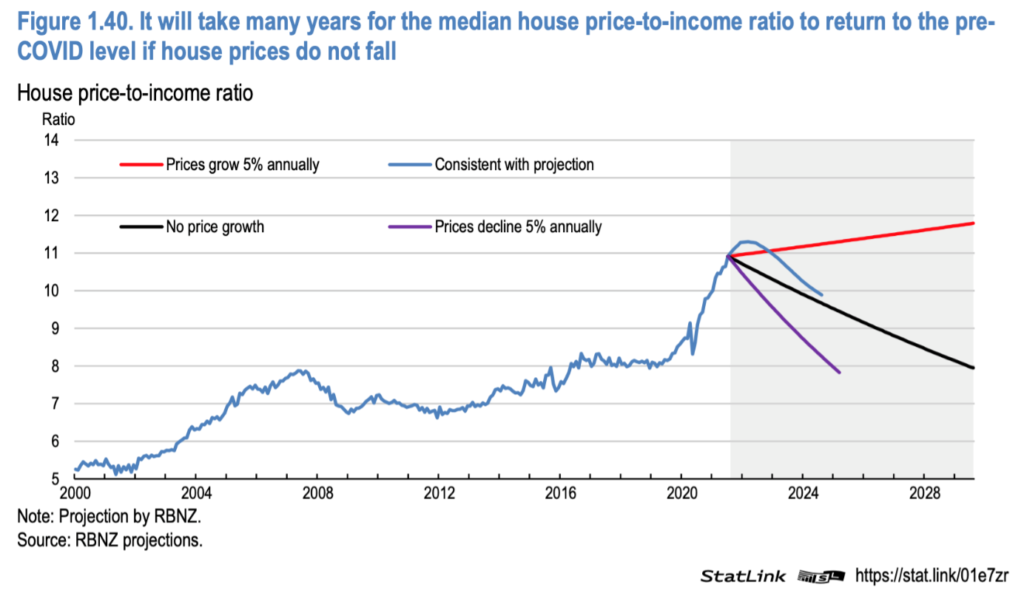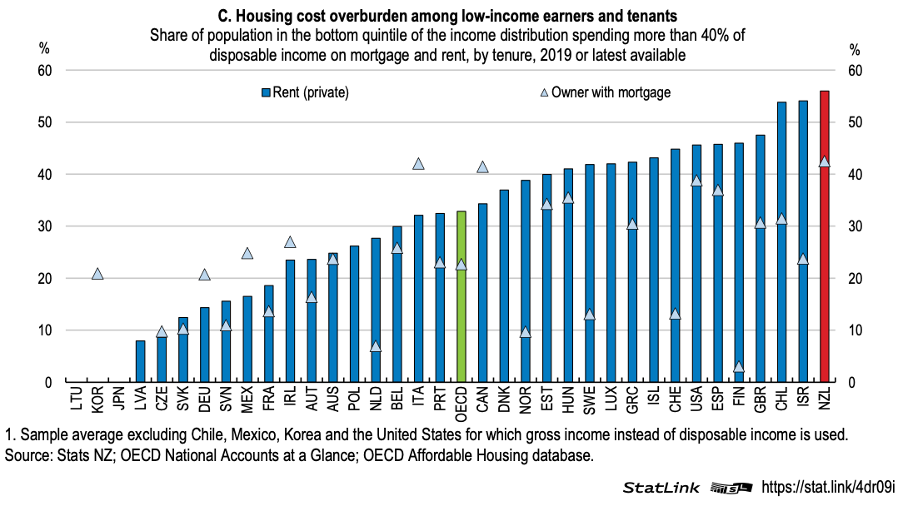
Last week we had a wonderful resume of just what happened to the economy after Covid 19 struck. The government, quite correctly, acted fast and implemented support systems to keep the economy operating. The unintended consequences of the support have resulted in a massive growing of the gap between the haves and the have-nots.
Watch the video
Here are two graphs which show just how hard it will be for young people to own their own houses. The first demonstrates how long it will take for houses to return to pre-COVID levels.

The second demonstrates how hard housing costs amongst the bottom quartile of income in NZ compare with the rest of the world.

In his column the Kaka Bernard wrote last week:
Robertson and the Reserve Bank have previously denied responsibility for the surge in house prices after their decision to print $58b to unleash a ‘wealth effect’ boost for the economy. But the OECD sheets the blame straight back to the Government and the Reserve Bank in its report (bolding mine).
“Runaway house prices are a major drag on wellbeing in New Zealand, especially for first-home buyers, and are by far the greatest concern identified by households in the IPSOS NZ Issues Monitor. Real house prices had already increased much more than in most other OECD countries since the turn of the century before the COVID-19 pandemic hit but went on to rise by another quarter since then, largely owing to the monetary policy measures implemented to support the economy House prices have also increased more relative to fundamentals – household income and rents – than in most other OECD countries. The large rise in house prices has increased wealth inequality between house-owners and non-owners.” OECD
This week John Harris a Guardian columnist wrote about people in power being quite remote from the poor:
Meanwhile, though poverty and disadvantage are kept festering by our cruel and miserly benefits system, the government seems to want to make things even worse. Never mind such obstacles to employment as expensive childcare and pitiful local public transport: last week, Johnson and his ministers announced a new scheme titled Way to Work, whereby unemployed people on universal credit will no longer be given three months to find their preferred job, but will instead be seemingly forced to take whatever work they can find after only four weeks. At that point, if they are deemed not to have made “reasonable efforts” to find work, part of their universal credit payments will be stopped.
The same day, it was reported that, after proposing to spend £3,000 of public money on a diplomatic lunch replete with high-end wine and gin, Liz Truss used a government private jet for an official trip to Australia at an estimated cost of £500,000. Such are the almost feudal features of current British politics, which take you straight to the heart of why, as prices zoom up, deprivation will only deepen. People steeped in excess are so far from the pain they keep causing that it barely registers: glasses clink, engines roar, cakes arrive, and the sound is simply drowned out.
Hopefully, our parliamentarians are not as remote as those in the UK.
However, it was at the end of his talk where Bernard really got me going. It was a “enough of the analysis, what are we going to do about it” moment.
He started talking about his 30/30 proposal. He wants everybody who was under 30 at the time of the first lock down for Covid 19 to be given a guarantee by the government that they will be supplied with housing which will not cost more than 30% of the average weekly wage. This might sound preposterous to those who see housing as an investment. However, to those who watch society through the fence, unable to participate because everything has become too expensive, it will be very appealing.
I have asked Bernard to put his thoughts down in writing and over the next period the Tuesday Club will invite a variety of speakers to consider what he is proposing and add to it. In two weeks, we will have Raf Manji speaking on the TOP party, so he will be the first to be able to consider this idea.
The main political parties will only respond to pressure. They are locked into the system as it is right now. Change is needed and we should be happy to participate in considering what this might be.
Bernard sent this to me after he had spoken:
I’d love Tuesday Club members to join as subscribers and have a special introductory offer for the first year. 50% off the usual one year subscription cost of $190, which means $95 for full access to all my emails and podcasts on The Kākā for a year, and the ability to comment on articles and get full access to my weekly webinars. Just click on this link to subscribe. https://thekaka.substack.com/TuesdayClub Full paid subscribers are supporting my journalist work on housing, climate and poverty, and ensuring it gets out to the public as articles online, and through other media appearances such as TVNZ Breakfast and RNZ.
Leave a Reply